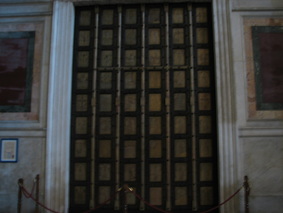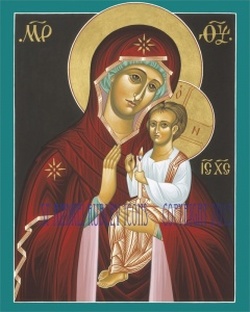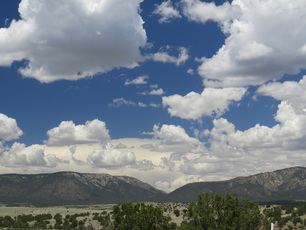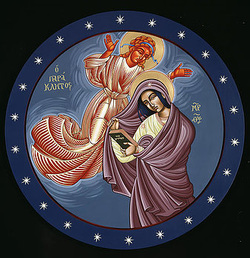 This week Pope Francis will officially open the Holy Doors of the basilicas in Rome to begin the Extraordinary Jubilee Year of Mercy. The purpose of the ritual is to invite us to begin the journey to and with mercy during this dedicated time. As pilgrims cross the threshold into the basilicas they are symbolically entering into God’s mercy. For those of us who are not able to be in Rome, we cross the threshold spiritually; all are called to renew our efforts at living the mercy we have been given. As one author put it, “Crossing the threshold means leaving behind doubt and fear and allowing God’s love to embrace us.”* In a sense, this marks a ‘double Advent.’ It is the advent of a year in which our hearts and minds are turned toward praying with expectant hope for ourselves and for the world to be filled with a greater attitude of mercy; and it is the second week of Advent in which we are attentive to the mysteries of the coming of Jesus. Reflection upon God’s gift of Himself and of His mercy should be the filter through which our prayer and actions flow. This is a time pregnant with hope, not stifled by darkness; no matter what is happening which is contrary to goodness, we need to allow God’s love to embrace us, and we pray to take that same love and share it with the world which is in such need. If ever evil is going to be conquered it is through mercy and forgiveness, through peace-making, kindness, and compassion. If that seems weak or improbable, it is not. It is the clear message of God during Advent: what seems weak is actually where strength resides. God comes as a baby. The parents are lowly and poor, from a “backwater” town in Galilee. They are virtually powerless as they are forced to travel to Jerusalem for a census. It does not get more improbable or weak-looking than that. And yet, from all these events, comes victory.  In this light, let us reflect upon the Virgin Mary as one who modeled this paradoxical strength. During her life she was obedient to God, humbly dedicating herself to doing His will. Therefore it is fitting that since her Assumption she has been sent from Heaven at various times to remind us of the message of the gospel. The appearance of Mary that is an excellent example is the one at Fatima in 1917. Even though this seems to have nothing to do with Advent, it actually has everything to do with it. Her appearance came during one of the darkest times in history. Communism and Fascism were rising and World War I was ravaging Europe. Into this time came Mary, speaking of unknown things to three illiterate, but pious, children in a place far from the war, a place where they had no way of knowing what was going on across the world. The messages consisted of dire warnings. They were to tell the world of the great need to repent. They were told to pray, especially the Rosary, for the reparation of the damage done by such oppressive sin. Mary divulged secrets to the children as well as messages for them to share with the world. The bottom line was that unless we prayed for reparation of sin and changed our sinful ways, destruction would happen that would be unlike anything seen before. But lest the point be missed, the message was definitely one of hope. If there was no hope, Mary would never have come in the first place. There is only a need to warn if there is hope of a different outcome than the one which looks immanent. And indeed the outcome was good: Russia was consecrated to the Immaculate Heart of Mary, and while sin and war are still present in the world due to our brokenness, it seems that the ultimate destruction that could have taken place was averted.** When Mary came in 1917 the times were bleaker than anyone realized, least of all the three children who had no idea what was going on beyond their little hamlet in Portugal. Many people took up the offer of mercy presented by Mary on behalf of God. And that offer of God’s mercy and hope to the world is just as relevant for us today. Our times are filled with many dangers, and the world is still filled with those who oppose Christian beliefs. We must never cease to hope in the power of God’s love, however: in this Year of Mercy we “leave behind doubt and fear, allowing God’s love to embrace us.”  It is important to note that the message of Fatima is also the Advent message of Sunday’s gospel: John the Baptist came onto the scene crying out for repentance for the forgiveness of sins. In quoting Isaiah, he said: “Prepare the way of the Lord, make straight His paths. Every valley shall be filled and every mountain and hill shall be made low. The winding roads shall be made straight, and the rough ways made smooth, and all flesh shall see the salvation of God.” (Luke 3:4-6) For all intents and purposes, that is actually the same message as delivered by Mary at Fatima. She was saying that unless we prepared our hearts for the Lord, unless we made straight His paths by our prayer for repentance, evil would continue to run rampant and all could be lost. Like Isaiah and John, she was affirming that God is in control, but that we have to be prepared. Therefore there is nothing to fear in any of these messages. They are pregnant with hope in the mercy of God. They contain an opportunity to be ready so that we may be open to new life and a new way of living, “that Israel may advance secure in the glory of God.” (Baruch 5:7). Fatima was a place of hope, not of dread. We should not focus on the seemingly dire messages or the images the children recounted from what Mary showed them. Instead we need to focus on the point behind them which is the message of hope which God wants for us to hear. As John proclaimed, God will make crooked ways straight. Times may seem murky now, but it is no less a time of hope than at any other time. Advent is a time in which we wait patiently for Jesus to come and make all things new. Emmanuel is always here, in the present: Jesus is God-with-us. The message of Fatima, (echoing the message of John), reminds us of the continued presence of Jesus, but it also teaches us that we must do our part, too. We must live with the courage and hope with which disciples have always had to live. No matter what happens in our world, Jesus is always present to the suffering, and quite often His presence comes through us; we may be the instruments through whom that mercy is offered. We need to remember that His mercy is offered not just to the faithful ones, but to everyone, including the intentional evildoers, terrorists, hoarders of the world’s goods, those who bring violence into their families or into the lives of strangers; it includes those who live in any manner of dishonesty and greed, those who kill the spirit, gossip, neglect the poor, neglect the weak among us such as children or the elderly. God’s mercy is for all of these people: that is, it is for all of us. But He needs us to be His instruments.  The mysteries of the second week of Advent and the messages sent by Mary remind us that all is pregnant with possibility if only we accept the offer. Mary accepted pregnancy with the Child whose life was threatened from the moment of His conception. She did not ask God to reconsider the timing or to do something to help her be less vulnerable as an unwed mother. She did not ask God to do things her way or to at least wait to overshadow her until she was married so that things would be a bit easier. Instead she said “Let it be done to me according to your will.” That is the stance of one who sees all things as pregnant with possibility and life. This is one who depends upon the mercy of God to make all things new and to accomplish His mission. This is why Mary could say yes to everything God asked of her. And this is why her pregnancy with mercy and hope is what we need to accept for ourselves. During this beginning of the Year of Mercy let us take upon ourselves the message of God throughout history, whether it comes through Isaiah, John the Baptist, Jesus, or Mary: this time is pregnant with the opportunity for mercy, hope, and new life. Let us “leave behind doubt and fear, allowing God’s love to embrace us.”  May we be filled with hopeful expectation, seeing everything as filled with possibility for new life! May we ask for the grace of having our hearts filled with mercy in a new way! May we accept the gift of mercy extended from God to us! May we have great gratitude for the mercy God offers us in forgiveness of our sins and in protection from that which would harm our souls in our daily lives! May we have the courage to embrace hope and to reject fear! And may we find blessing and joy in the gifts offered to us in this Jubilee Year of Mercy! Let us continue to meet in the merciful Heart of Jesus! Come swiftly, Lord! Peace! ©Michele L. Catanese *From the Introduction (page 1) of Crossing the Threshold of Mercy, edited by Mark-David Janus, CSP, PhD. This is an excellent resource for the Jubilee Year of Mercy. **Some good books on the apparition of Mary at Fatima: - A Woman Clothed With the Sun, edited by John Delaney - Fatima for Today: The Urgent Marian Message of Hope by Andrew Apostoli - A film and accompanying resources: The 13th Day. Here is a link to the website for the film: http://www.the13thday.com/ The top photo is mine. It is the Holy Door at the Basilica of St. Paul Outside the Walls in Rome, Italy. The icon is Mother of God Light in All Darkness by Fr. William Hart McNichols. It is one of my favorite Marian icons by Fr. Bill. It speaks to me of of hope and mercy. If you are interested in a copy you can find it at http://fineartamerica.com/featured/mother-of-god-light-in-all-darkness-016-william-hart-mcnichols.html. Next is another of my photos, taken in New Mexico. Following the mountain photo is another of the icons of Fr. William Hart McNichols, The Mother of God Overshadowed By the Holy Spirit. You can find it at http://fineartamerica.com/featured/the-mother-of-god-overshadowed-by-the-holy-spirit-118-william-hart-mcnichols.html
Carmella Wygant
12/8/2015 06:45:19 am
I praise God for your parents Michele. We alone bind ourselves, the human condition can be so limiting, unable to see we are more than our sins. The reminder that God's mercy is for all is a cornerstone of God's relentless love for us. Comments are closed.
|
Heart Speaks to Heart
|

 RSS Feed
RSS Feed

